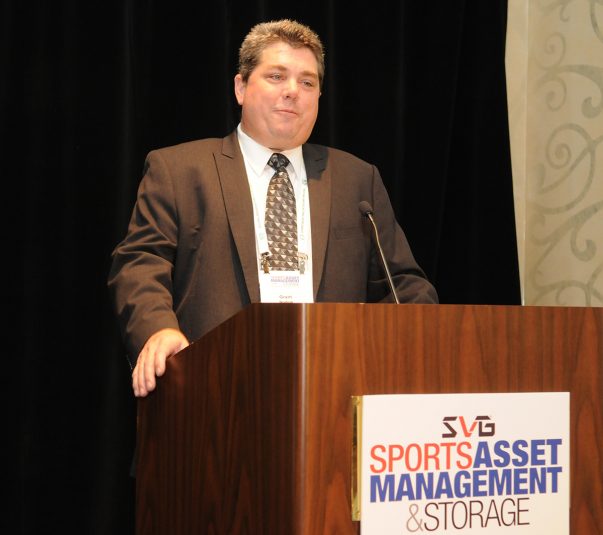SAMS Forum: ‘State of Industry’ Spotlights Metadata Management
Content producers approach a variety of challenges in different ways
Story Highlights
SVG’s Sports Asset Management and Storage (SAMS) Forum celebrated its 10th anniversary on Tuesday with a new venue and a fresh take on the most pressing issues facing this key market segment. From metadata management and object storage to cloud-based systems and IP workflows, the annual SAMS Forum covered it all and provided a forum for more than 240 industry leaders to share their current challenges, target future opportunities, and check out the latest technology.

SVG’s 10th-annual Sports Asset Management & Storage Forum drew a packed house at the Westin New York in Times Square.
The SAMS Forum, which took place at the Westin New York at Times Square, began with a welcome by SAMS Chairman Grant Nodine, SVP, technology, NHL, and offered a packed day of informative panel discussions and three case studies spotlighting the media-asset–management (MAM) workflows of PGA TOUR Entertainment, the Golden State Warriors, and Werne Production House.
“The term asset management means something much larger and more complex than it once did,” said Nodine. “We find ourselves on the forefront of this evolutionary change in scope and scale, because sports is the last consistently and predictably high-value live content.”
The reason for improving MAM workflows, standardizing metadata schemes, and spotlighting new technologies, he said, is to enable broadcasters to better tell each sport’s story through video.
“We may not be painting the ceiling of the Sistine Chapel,” Nodine pointed out, “but we built the scaffolding, supplied the brushes, and custom-mixed the colors used to create a magical masterpiece. And, in the world of sports, we line up to do it again and again, game in, game out.”
The first panel discussion, in what has become a SAMS Forum tradition, set the table by offering attendees the “State of the SAMS Industry,” featuring representatives from industry heavyweights MLB Network, Atlantic Coast Conference, HBO, Turner Sports, and WWE.

The opening panel at the SAMS Forum focused on the state of the industry and the importance of metadata.
MLB Network, which recently brought NHL Network under its purview, now faces the additional challenge of managing a second league’s content. Tab Butler, director, media management and postproduction, MLB Network, addressed the recent rollout of its DIAMOND system for hockey — “We put some skates on it and called it DIAMOND on ICE,” he quipped — and kicked off a discussion on the challenges surrounding the management of an ever growing content library.
“As more and more content is brought in, managed, repurposed, and published, all you can really say is, it’s a factory. It’s a content factory,” he said. “We’re trying to keep up with the demands, the deliverables as well as the receivables.”
Because a content library is valuable only if users can find the content they need, the conversation quickly turned to metadata management. Kathleen Shannon, library manager, Turner Sports, spoke of the challenge of having many users with just as many approaches to metadata.
“We are definitely at the point where we are saying enough is enough,” she said. “We have an amazing number of different user groups that want access to the content, that want to add information about that content — everything surrounding the event — in addition to just accessing the video. And, of course, none of them have one overarching data model that satisfies everyone; very specific needs lead to very specific metadata models.”
Although attempting to standardize a metadata scheme within a large company like Turner Sports is possible, Turner faces the additional challenge of ensuring that content can be searched for and found by its broadcast partners.
Bryan Staffaroni, senior director, media-asset management, WWE, expanded on the standardization challenge with a comment on the fast-paced, deadline-driven nature of sports broadcasting.
“At the end of the day, it’s all about getting assets to the people that need them as quickly as possible,” he said. “We can’t come up with a uniform metadata scheme for everything, but we can categorize and store away assets — the same asset in multiple areas — and guide people toward these things. It’s extremely challenging, and you can focus all your efforts on trying to solve that, but, a lot of time, the demand is high, and deadlines are furious, and you’ve got to produce results.”
Making assets too easy to find, however, can bring up rights-management issues. Staffaroni’s solution is to make low-resolution proxies of WWE content easily accessible while maintaining control over who can access the high-resolution versions.
At HBO, Operations and Creative Producer James Pilott wants the Sports Group’s content to be easily accessible throughout the company for promotional purposes. Other groups — specifically, those producing hit television shows with massive followings — do not share that approach.
“Within HBO,” he explained, “we have a discrete sports department, which is its own little island within the company in terms of media. Without being secretive, we would never be able to access a Game of Thrones episode before air. We’re basically in the business of drumming up business for our broadcasts. … We have to market our media, so, to that point, we encourage other areas within the company to dip into our projects and dip into our media.”
Scott McBurney, associate commissioner, ACC, faces the added challenge of managing assets across multiple independent institutions, some of which have sophisticated MAM systems in place and some of which do not.
“We’re still in the infancy of how we’re creating our metadata world,” he explained. “In our office specifically, we want people to consume our content, and so we try to make it available. … Generally speaking, we encourage usage to help promote our schools and our sports. The challenge that we face is trying to find some sort of common ground with our schools — our 15 institutions who are doing things their way — and conference office that is doing their thing. As a group, we need to come together and find a way to make sure that at least some portion of what we’re doing in the metadata world has a common ground.”
Check out this SVG On Demand with Turner Sports’ Kathleen Shannon for more from the SAMS Forum:






